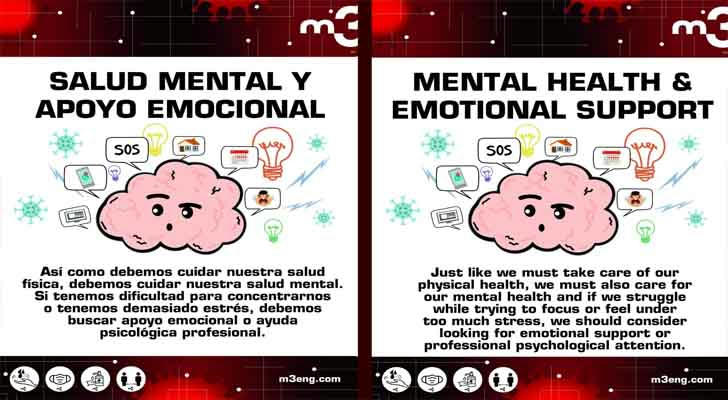The Power of Mental Health and Emotional Support: Why It’s Okay to Ask for Help
We live in a world that’s constantly buzzing—work emails, social media updates, family obligations, and the never-ending to-do lists. In all this noise, it’s easy to forget about something incredibly important: your mental health. Just like we go to the doctor when we have a physical issue, our minds need just as much care and attention. But sometimes, taking care of our mental well-being doesn’t come naturally. That’s where emotional support comes in, and trust us, it’s a game-changer!
Let’s dive into the importance of mental health and emotional support—and how both can transform your life in ways you might not expect. 🌟

1. Mental Health Isn’t Just About Feeling Sad: It’s a Part of You
When most people think of mental health, they often associate it with depression or anxiety, but the truth is, mental health is far more than that. It’s about your overall emotional, psychological, and social well-being—it’s how you handle stress, relate to others, and make choices.
We often think of mental health as something we only focus on when something goes wrong, but really, it’s something we should nurture every day. Just like exercising for your body, taking care of your mind needs attention, too. A mentally healthy person feels better equipped to handle life’s challenges, from relationship struggles to work stress.
So, it’s important to view mental health as a constant, ongoing part of your life, not just something to pay attention to when you're feeling low.
2. Emotional Support: The Unsung Hero of Mental Wellness
Have you ever had one of those days where everything seems overwhelming, and just talking to someone made you feel 10 times lighter? That’s emotional support at work, and it’s vital for mental well-being. But what does emotional support really mean? It's the comforting, understanding, and validation that comes from people around you, whether it’s a friend, family member, or even a therapist.
- Listening without judgment can be incredibly healing. Sometimes all you need is someone to listen while you vent about your day or your frustrations, without offering advice or solutions.
- Affection and encouragement from others help us feel safe, loved, and valued.
- Reassurance during tough times reminds us that we’re not alone, and that we can navigate through difficult moments.
Emotional support isn’t always about fixing problems—it’s about offering understanding and compassion. And the best part? It doesn’t have to be a huge gesture. A text message, a hug, or simply checking in can make a huge difference in someone’s day.

3. Emotional Support Isn’t a One-Way Street
While it’s important to have emotional support from others, it’s also important to be there for others. Emotional support works both ways—when you’re open to providing it, you strengthen your own mental health, too. Offering a kind word or a safe space for someone else to share their feelings can actually improve your own sense of connection and purpose.
Studies show that people who engage in supportive relationships tend to have lower levels of stress and better mental health outcomes. Helping others is not just a selfless act—it helps nurture your own emotional well-being.
4. A Real-Life Example: Meet Emma
Let’s talk about Emma, a 28-year-old graphic designer living in New York City. Emma loved her job, but lately, she had been feeling constantly drained. Between managing her career and dealing with some personal challenges, she was struggling to balance everything. Her mind felt cluttered, and she couldn’t shake the feeling of being overwhelmed. She tried to keep up with everything on her own—telling herself she just needed to push through.
One afternoon, feeling particularly low, Emma reached out to her close friend, Sarah, for a chat. Sarah immediately made space for Emma to express everything she was feeling. Instead of offering solutions or trying to fix things, Sarah simply listened—validating Emma’s feelings and reminding her that it was okay to be overwhelmed sometimes. Sarah reassured Emma that she wasn’t alone, and that she deserved to take time for herself.
This small act of emotional support shifted Emma’s perspective. By the end of the conversation, she felt a lot lighter. Emma realized that it was okay to lean on others and that asking for help didn’t mean she was weak—it meant she was taking care of herself.
A week later, Emma decided to take a few days off work to recharge. She also started seeing a therapist to work through some of her stress and anxiety. By incorporating emotional support from her friend and professional help into her life, Emma began to feel more in control and mentally clear.
Her experience highlights an important truth: you don’t have to carry everything alone. Even small acts of emotional support can spark big changes in how you approach mental health.

5. The Science Behind Emotional Support and Mental Health
You might be wondering, does emotional support really work? The short answer: Absolutely. Research shows that social support can have a direct, positive effect on mental health. Studies have found that individuals who receive emotional support have lower levels of cortisol (the stress hormone), better immune function, and are more likely to recover from stressful situations more quickly.
Moreover, emotional support can enhance feelings of self-worth and connectedness. In times of emotional stress, knowing that you have people to turn to who care about you makes life feel a lot less isolating.
6. How to Ask for Emotional Support (Without Feeling Guilty)
Sometimes, asking for emotional support can feel hard, especially if you’re used to being the “strong one” or the go-to person for others. But here’s the secret: It’s okay to ask for help, and it’s normal to need support.
Here are a few tips for reaching out:
- Be honest: You don’t have to sugarcoat what you’re feeling. If you’re feeling overwhelmed or stressed, say it. People will appreciate your vulnerability.
- Communicate your needs: Let the person know what kind of support you’re seeking. Do you need someone to listen, or are you looking for advice? Be clear so they can support you in the best way possible.
- Don’t wait for the perfect moment: Emotional support doesn’t have to be saved for the “big crises.” Reach out during the little struggles, too. Small check-ins with friends can go a long way in preventing burnout.

Conclusion: Your Mental Health Deserves Attention
Mental health is not something that’s meant to be dealt with in isolation. We all need emotional support, whether it’s from friends, family, or professionals. The key is recognizing when you need help and reaching out without hesitation. You don’t have to have everything figured out to be worthy of support. In fact, it’s often when we are feeling the most vulnerable that we need it the most.
So, remember—your mind is just as important as your body. Nurture it with kindness, seek support when you need it, and offer it to others in return. Your mental health deserves attention, and so do you. 💙🧠
